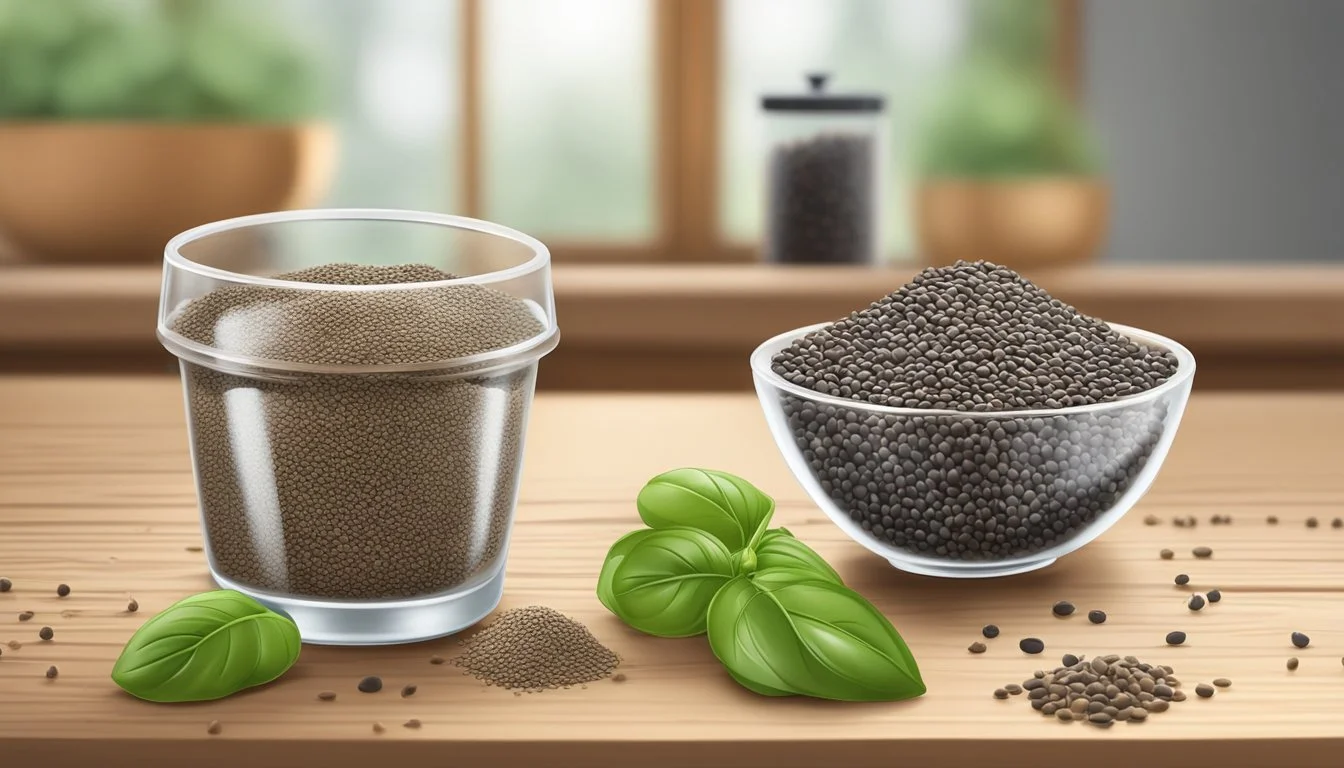Basil Seeds Substitutes
Top Alternatives for Smoothies and Recipes
For those moments when basil seeds are unavailable, it's essential to explore effective substitutes to maintain the integrity of your recipes. Chia seeds stand out as one of the best alternatives due to their similar texture and nutrient profile. These tiny seeds can mimic the gelatinous consistency of soaked basil seeds, making them perfect for recipes like puddings and drinks.
Another viable option is flax seeds, especially when ground. They offer a unique nutty flavor that can complement a variety of dishes. Unlike basil seeds, flax seeds need to be ground to fully utilize their thickening properties in cooking, but their rich omega-3 content makes them a healthy substitute.
For a more herb-based substitute, ground fennel seeds provide a slightly sweet and aromatic flavor that can enhance both savory and sweet recipes. This substitution works particularly well in baking and spice blends, offering a distinct flavor profile that can act as a stand-in for basil seeds.
Understanding Basil Seeds
Basil seeds, often overshadowed by chia seeds, offer an impressive array of nutritional benefits and have a variety of culinary uses. This section delves into the details of their nutritional profile and the unique ways they can be used in cooking.
Nutritional Profile and Benefits
Basil seeds are packed with nutrients, boasting high levels of fiber, protein, and omega-3 fatty acids.
They are also rich in vitamins like A, K, and C, along with minerals such as calcium, magnesium, and iron. These seeds have been traditionally used in Ayurvedic and Chinese medicine due to their potential health benefits, including improved digestion and anti-inflammatory properties.
Health Benefits:
Aid in Digestion: The high fiber content helps in smooth bowel movements.
Blood Sugar Control: Studies suggest these seeds may help in regulating blood sugar levels.
Weight Management: Due to their ability to expand in water, they can promote a feeling of fullness.
Culinary Uses of Basil Seeds
In cooking, basil seeds are prized for their ability to swell and form a gel-like texture when soaked in water. This makes them a popular ingredient in both Asian desserts and beverages.
They offer a neutral flavor, allowing them to easily blend with other ingredients without overpowering them. This unique texture is particularly valued in drinks like falooda and various Thai beverages.
In Desserts:
Used in ice creams, puddings, and yogurts for added texture.
In Mediterranean and Italian Cuisine:
While not traditionally used, they can be incorporated into modern recipes to enhance texture in dishes like soups and salads.
Recipes:
Often added to lemonades and smoothies.
Can be sprinkled over fresh fruit bowls or layered in parfaits for a nutrient boost.
Basil seeds not only bring a distinctive texture to recipes but also a nutritional punch, making them a versatile addition to any kitchen.
Primary Basil Seed Substitutes
When looking for substitutes for basil seeds in recipes, considering factors like texture, flavor profile, and how they perform in various dishes is crucial. Below are three primary alternatives that can effectively replace basil seeds in different culinary uses.
Chia Seeds
Chia seeds are an excellent basil substitute due to their similar gelatinous texture when soaked in liquid. They absorb up to 12 times their weight in liquid, forming a gel-like consistency that works well in recipes like puddings, beverages, and as a thickening agent.
Flavor: Chia seeds have a neutral flavor, which makes them a good substitute in recipes where you don't want to alter the flavor profile.
Ratio: Typically, you can use chia seeds in a 1:1 ratio as a direct substitute for basil seeds.
Uses: Ideal for smoothies, salads, and cooking applications where texture is more important than flavor.
Flaxseeds
Flaxseeds serve as another practical substitute for basil seeds. While they also form a gel-like texture when soaked, flaxseeds have a slightly nuttier taste, which may affect the flavor of certain dishes.
Texture: Flaxseeds thicken liquids similarly to basil seeds, but they might need slightly longer soaking times.
Flavor Profile: Their mild nutty aroma can enhance dishes rather than just blend in.
Ratio: For most recipes, ground flaxseeds can be used at a 1:1 ratio as a basil seed replacement.
Uses: Suitable for salads, baking, and as an egg substitute in vegan cooking.
Tukmaria Seeds
Tukmaria seeds, also known as sabja or sweet basil seeds, are closely related to common basil seeds, making them a near-perfect substitute. They similarly swell in water and have a comparable texture.
Flavor: Tukmaria seeds have a neutral flavor, making them virtually indistinguishable from basil seeds in recipes.
Ratio: You can substitute tukmaria seeds for basil seeds at a 1:1 ratio without any issues.
Uses: Often used in desserts, drinks, and cooking applications requiring gel-like consistency.
By understanding each of these basil substitutes, you can make the right choice for your specific culinary needs, ensuring your dishes maintain the desired texture and flavor.
Herbal Alternatives
Herbal substitutes for basil seeds bring different flavors and aromas suitable for various dishes. Specific herbs like dried basil, mint, oregano, parsley, and cilantro offer unique characteristics ideal for enhancing salads, pesto, and sauces.
Dried Basil
Dried basil is a convenient substitute, offering a concentrated flavor.
When substituting with dried basil, use approximately one-third of the amount you would with fresh basil due to its potent nature.
Dried basil blends well in tomato sauces, Italian seasoning, and pesto, maintaining the classic basil aroma and flavor profile.
It works especially well in cooked dishes, as its flavors are released during the cooking process.
Mint and Oregano
Mint and oregano serve as refreshing alternatives, each with distinct characteristics.
Mint offers a bright, slightly sweet taste with a cooling effect, enhancing salads and garnishes.
Oregano, from the same mint family, has a robust, earthy flavor, perfect for pasta sauces and Italian dishes.
Both herbs can be used in similar ratios to fresh basil, but their distinct flavor profiles can significantly alter the final dish's taste.
Parsley and Cilantro
Parsley and cilantro provide unique flavors and are versatile substitutes in Latin American dishes and fresh garnishes.
Parsley offers a mild, slightly peppery taste, great for salads and pesto, without overpowering other ingredients.
Cilantro brings a citrusy, somewhat spicy flavor, ideal for salsa and various Asian and Latin American recipes.
Both herbs contribute fresh, vibrant notes, complementing a wide array of dishes, while offering a different aromatic experience from basil.
Leafy Green Alternatives
Leafy greens such as spinach leaves, arugula, and celery leaves can serve as practical substitutes for basil seeds in various recipes. Each alternative offers distinct flavors, textures, and colors, adding unique characteristics to your dishes.
Spinach Leaves
Spinach leaves are an excellent substitute due to their mild flavor and vibrant green color. Spinach lacks the strong aroma of basil but provides a fresh, slightly sweet taste.
The texture of spinach leaves is tender and smooth, making them suitable for salads and cooked dishes. They blend well in Mediterranean dishes where their mild flavor does not overpower other ingredients.
Spinach also boasts numerous nutritional benefits, being rich in vitamins A, C, and K, as well as iron and calcium.
Arugula
Arugula, also known as rocket, brings a peppery flavor and bright green color to your plate. This leafy green is notable for its bold taste, which can add a spicy kick to your recipes.
The texture of arugula is somewhat coarse compared to spinach, giving a more robust mouthfeel. It pairs wonderfully in salads, adding a distinctive zing that contrasts nicely with milder ingredients.
Arugula is packed with nutrients, including vitamins A, C, and K, and folate, making it a healthy and flavorful addition to many dishes.
Celery Leaves
Celery leaves are often overlooked but are a fantastic substitute due to their strong aroma and savory flavor. The leaves possess a subtle bitterness and a touch of parsley-like freshness, enhancing the overall taste of your dish.
The texture of celery leaves is more fibrous, offering a pleasant contrast when used as a garnish or mixed into cooked dishes. These leaves are particularly useful in soups and stews where their robust flavor can fully develop.
Nutritionally, celery leaves are beneficial, providing vitamins A and K and a variety of antioxidants. Their versatile nature allows them to blend seamlessly into various culinary applications.
Spices and Seasonings
When substituting basil seeds in various dishes, understanding the different spices and seasonings that can mimic basil’s unique flavor is crucial. Below are some spices and seasonings that can serve as excellent alternatives, providing the necessary aromatic and flavorful elements.
Thyme and Tarragon
Thyme and tarragon both offer a peppery and aromatic quality that can imitate the flavor profile of basil seeds. Thyme's savory taste pairs well with poultry and other meats, making it ideal for savory dishes. Tarragon, on the other hand, has a more subtle aroma with hints of citrus, which can enhance salad dressings or sauces. Using a 1:1 ratio of these herbs to replace basil seeds ensures a balanced flavor.
Lemon Basil
Lemon basil, with its citrus and fresh aroma, can be an excellent substitute for basil seeds. It brings a flavorful burst to dishes, particularly in Italian recipes and Mediterranean cuisine. The tangy and peppery notes of lemon basil make it suitable for both savory dishes and desserts. A notable attribute is its ability to brighten up a dish, making it ideal for salads and dressings.
Italian Seasoning
Italian seasoning is a blend of herbs including oregano, thyme, and rosemary, which often contains basil as well. This seasoning blend provides a well-rounded flavor profile suitable for many Italian and Mediterranean dishes. Italian seasoning is particularly useful in tomato-based sauces and pasta dishes where a mixture of herbs is desired. It adds a savory and aromatic depth to meals, making it a versatile substitute.
By focusing on these spices and seasonings, a cook can replicate the complex flavors that basil seeds provide in a variety of culinary applications.
Additional Considerations
When using substitutes for basil seeds in recipes, it's essential to think about how the flavor and ratios might change in your dishes. Each substitute has a unique flavor profile, and the right proportions will ensure your dishes turn out as intended.
Flavor Matching in Recipes
When choosing a substitute, the goal is to match flavors as closely as possible to maintain the integrity of the recipe. For instance, chia seeds come closest in terms of texture and nutritional profile. They work well in smoothies and puddings. Meanwhile, flax seeds are slightly nutty and can be used similarly, but with a different flavor twist. Consider using hemp seeds in Mediterranean dishes where a subtle, nutty flavor can be beneficial. Knowing the flavor profiles helps in selecting the right replacement for basil seeds.
Proportions and Ratios
Besides flavor, getting the right proportions ensures your recipes maintain the intended texture and consistency. Generally, a 1:1 ratio works well with seeds like chia and flax. For dishes that are especially liquid-sensitive, pre-soak the substitute seeds to mimic basil seeds' gel-like consistency. For example, if the recipe calls for 1 tablespoon of basil seeds, use 1 tablespoon of pre-soaked chia seeds. Adjusting the ratio ensures the unique characteristics of each seed type contribute effectively to the final dish without overpowering it.





